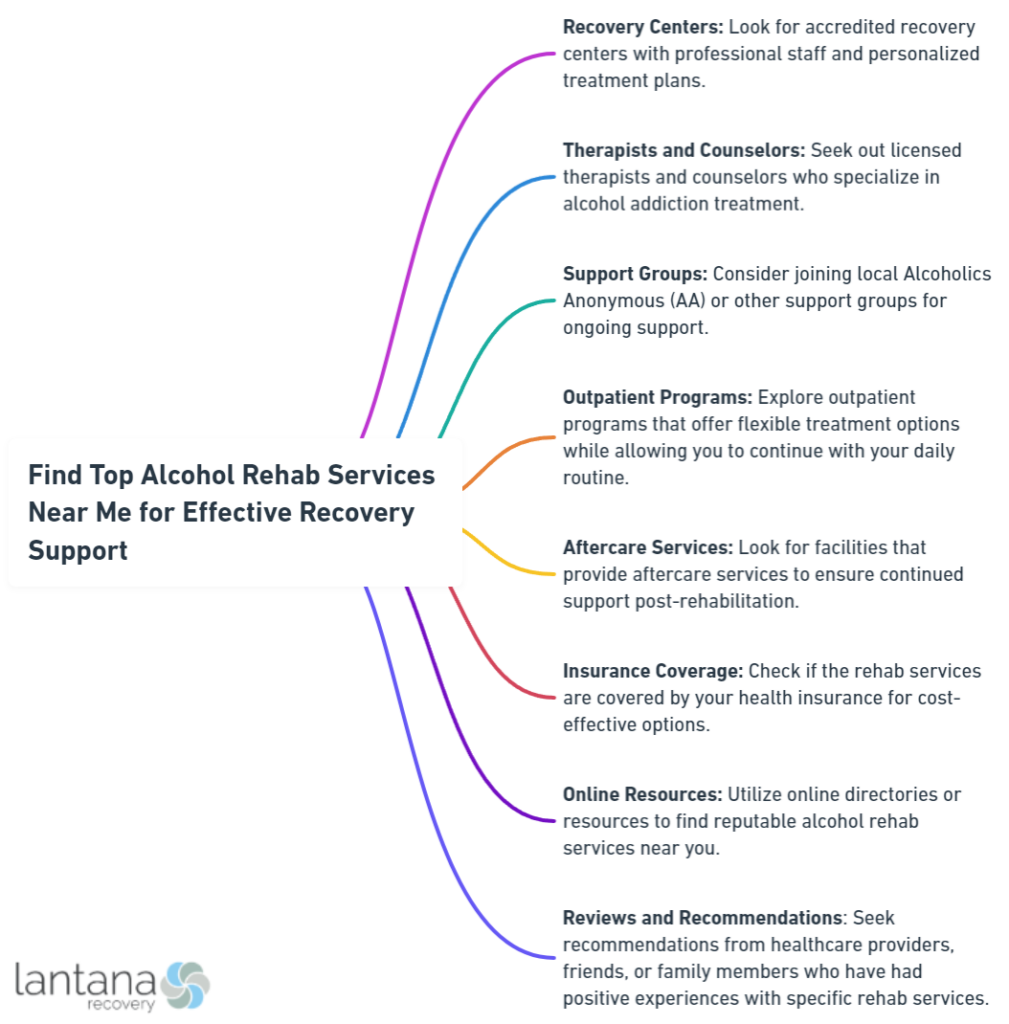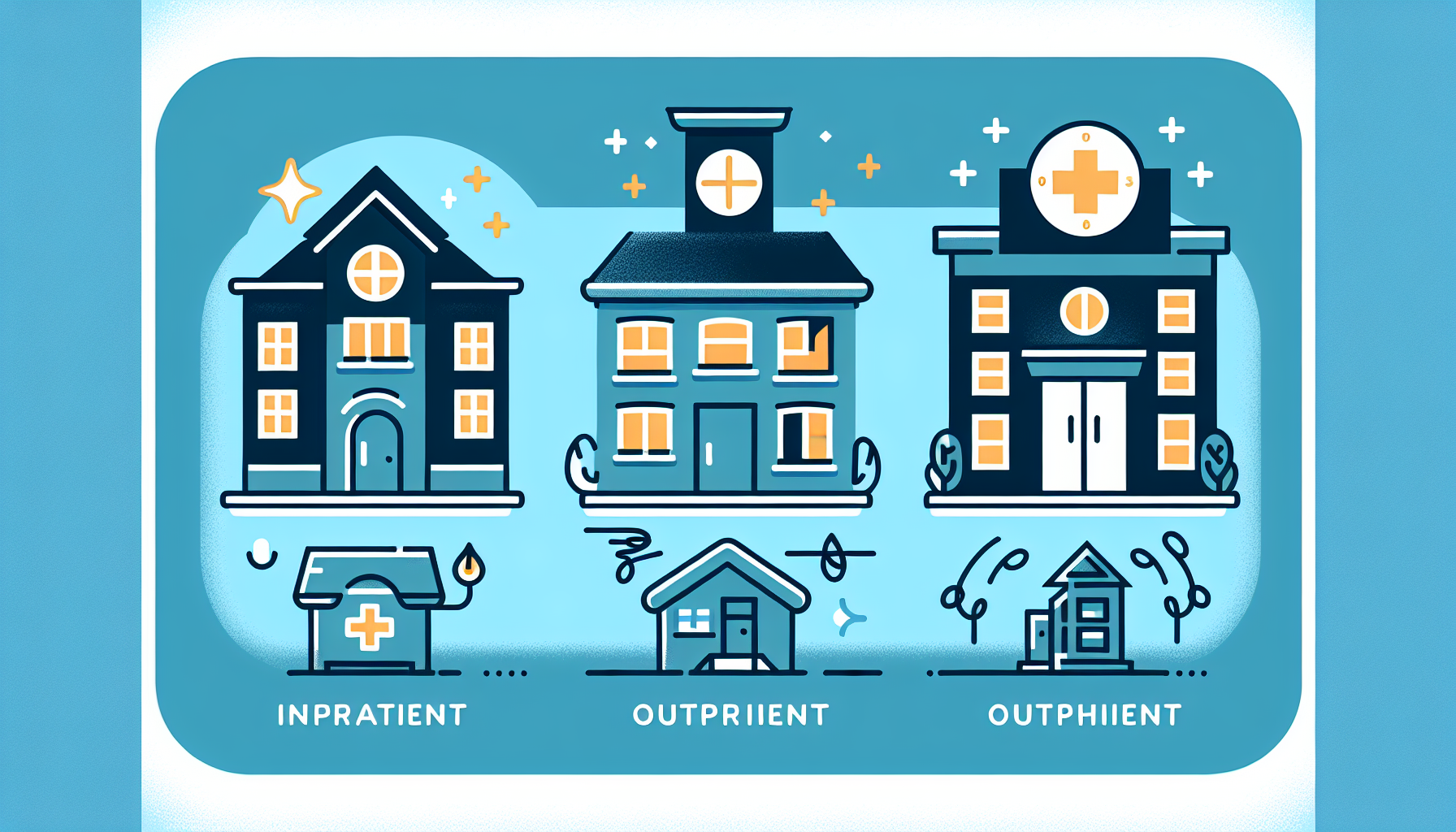Confronting alcohol addiction is a courageous act, and finding the right support close to home is essential. In this article, you’ll discover a roadmap to accessible, quality “alcohol rehab services near me” in your vicinity. We’ll walk you through different treatment options, how to select the best program for your needs, and smart ways to manage the financial side of recovery. Start your journey to sobriety with confidence, armed with the knowledge you need from local resources.
Key Takeaways
- State and federally funded resources provide accessible alcohol rehab services, with specialized priority treatment available for pregnant women and those in urgent need, though demand often leads to long waitlists.
- Different types of rehab programs such as inpatient, outpatient, and intensive outpatient programs cater to various needs, with each offering tailored support toward sobriety through therapy, medical care, and other mechanisms.
- Long-term sobriety is supported through comprehensive aftercare services, including sober living homes and alumni programs, emphasizing the importance of ongoing support and community in maintaining recovery.
Navigating Alcohol Rehab Services in Your Vicinity
Finding the right alcohol rehab services near you is akin to setting the cornerstone for a sturdy foundation in recovery. Embarking on this quest may seem overwhelming, but fear not, for a trove of resources awaits to guide you. The Directory of Single State Agencies for Substance Abuse Services and SAMHSA’s comprehensive listings serve as beacons in the mist, illuminating the way to state-funded alcohol treatment facilities within reach. These treatment programs, offering everything from inpatient to outpatient support, cater to individuals from all walks of life, ensuring that proof of residence, income, and a candid recount of your journey with alcohol abuse pave the way to the assistance you deserve.
However, it is important to understand that these state-funded havens, while providing vital support, are frequently stretched to their capacity, with long waitlists indicating high demand. But hold onto hope, for even within these constraints, there are pockets of priority—pregnant women and others in urgent circumstances can often receive expedited treatment. This is the first step in a marathon of perseverance, for the road to recovery is one of patience and resilience.

Alcohol Rehab South Carolina
When seeking alcohol rehab in South Carolina, it’s essential to consider various factors such as location, treatment programs offered, and success rates. South Carolina boasts numerous rehabilitation centers specializing in alcohol addiction treatment, providing a range of therapies tailored to individual needs. These facilities often offer comprehensive programs that include detoxification, counseling, therapy sessions, and aftercare support to help individuals achieve and maintain sobriety. Additionally, many alcohol rehab centers in South Carolina emphasize holistic approaches, integrating physical, mental, and emotional well-being into their treatment plans. With the right support and resources, individuals struggling with alcohol addiction can embark on a journey toward recovery and lead fulfilling lives free from substance dependency.
Understanding Different Types of Alcohol Treatment Programs

The landscape of addiction treatment is diverse, with a spectrum of programs tailored to meet the unique needs and circumstances of each individual. Grasping the differences between inpatient facilities, outpatient options, and intensive outpatient programs is key to selecting a path that best suits your degree of alcohol addiction, mental health status, support network, and financial means.
Whether you require the immersive environment of inpatient care or the flexibility of outpatient services, each program shares a common goal: to guide you toward sobriety with an array of therapy sessions, medical care, and support mechanisms.
Inpatient Treatment Facilities
In the serene sanctuaries of inpatient treatment facilities, you are cocooned from the chaos of the outside world, allowing you to focus solely on your recovery. These centers are not just shelters but transformative spaces, where the tranquility of the environment is as integral to your healing as the therapy itself.
Here, you’ll find a structured routine filled with therapy sessions and medical support, with professionals at the ready to guide you through detox and manage any withdrawal symptoms with the utmost care. This is a place where you can surrender to the process, safe in the knowledge that every need is met as you take the brave steps toward long-term recovery.
Outpatient Treatment Options
Outpatient treatment programs offer a bridge between the immersive world of inpatient care and the demands of everyday life. Flexible and adaptive, these programs allow you to maintain your daily responsibilities while embarking on your recovery journey, providing a structure that can be as resilient and enduring as you are. With services that span from medication-assisted detox to individual counseling sessions and support groups, outpatient treatment is a testament to the belief that recovery can be woven into the fabric of your daily existence.
Accessible through various community-based settings, these programs stand as pillars of support, steadfast in their commitment to your sobriety.
Intensive Outpatient Programs
For those who stand at the crossroads, requiring more than the traditional outpatient setting yet less than the round-the-clock care of inpatient services, intensive outpatient treatment programs, also known as Intensive Outpatient Programs (IOPs), offer a middle path. These programs deliver a concentrated dose of recovery support, with sessions that extend beyond the standard outpatient care, adapting in intensity and duration to your evolving needs.
Through a curriculum designed to arm you with relapse prevention tactics and coping strategies, IOPs address not just the physical but also the emotional and social challenges that accompany alcohol addiction. It’s a tailored approach, one that flexes with your personal growth and fortifies your resolve as you reclaim control over your life.
Essential Features of Quality Alcohol Rehab Centers

As you strive to combat alcohol addiction, it’s vital to align yourself with a rehab center known for its quality and trustworthiness. Accreditation from esteemed bodies like JCAHO and CARF is a hallmark of excellence, signifying a commitment to the highest standards in addiction treatment and care. These accreditations ensure that a facility’s practices, staff qualifications, and treatment efficacy are held to rigorous scrutiny, with regular evaluations to foster continuous improvement.
Beyond the seal of approval, these drug rehab centers, also known as treatment centers, are distinguished by their comprehensive health assessments and personalized treatment plans, crafted by trained and certified clinicians who bring expertise and compassionate care to your recovery.
The Role of Insurance in Accessing Alcohol Rehab Services

Navigating the financial landscape of alcohol rehab services can often be as complex as the recovery journey itself. Fortunately, there are various options available to help cover the costs of rehab. These include:
- Private insurance: The Affordable Care Act has expanded coverage for substance use disorders, ensuring that essential rehab services are covered by insurance plans.
- State-funded programs: If you don’t have private insurance, there may be state-funded programs available to help cover the costs of rehab.
- Regulations preventing denial of coverage: The Affordable Care Act also includes regulations that prevent insurance companies from denying coverage for pre-existing conditions. It’s important to note that insurance plans may cover a range of services, from detoxification to counseling. To understand the specifics of your coverage, it’s recommended to consult with insurance specialists and rehab centers who can help decipher your benefits and facilitate the coverage process.
While out-of-pocket costs may be part of the equation, options such as financing plans, scholarships, and sliding scale fees ensure that financial barriers do not impede access to vital treatment services.
Holistic Approach to Alcohol Addiction Recovery

The journey to sobriety from drug and alcohol addiction is not a path trodden by the body alone but an expedition of mind, spirit, and emotion. A holistic approach to alcohol addiction recovery recognizes this interconnectivity, offering therapies that envelop every facet of your being. By addressing nutritional deficiencies, fostering spiritual growth, and healing emotional wounds, holistic therapy seeks to fortify your entire self against the lures of alcohol. Such treatments do more than alleviate the symptoms of addiction; they nurture emotional balance, stress resilience, and provide a pantheon of coping mechanisms that serve as a bulwark against relapse.
Moreover, the embrace of a holistic approach extends to physical practices like yoga and tai chi, and the serenity of guided meditation, all of which contribute to a sense of equanimity and control over one’s urges. Activities like art therapy and outdoor adventures not only enrich the recovery experience but also restore the connections to community and social engagement that addiction may have damaged.
Support Systems and Group Meetings
The path towards sobriety is not a solitary journey but a communal expedition with companions who are well-acquainted with the landscape of addiction. Peer support groups and family therapy sessions are like the compass and guidebook in this journey, providing direction, encouragement, and a sense of camaraderie that is essential for enduring recovery. These support systems serve as a testament to the power of collective wisdom and shared experiences, not only enhancing treatment engagement but also diminishing the likelihood of substance use.
Family therapy, in particular, has a profound impact, repairing the fabric of relationships torn apart by addiction and bolstering treatment retention and engagement. As the journey continues beyond the walls of rehab centers, ongoing care groups offer a sanctuary where individuals can continue to share their triumphs and trials, reinforcing the unity that sustains long-term sobriety.
Specialized Programs for Diverse Needs
Recovery from alcohol addiction is not a one-size-fits-all endeavor. Each individual’s narrative is unique, and thus, specialized programs have emerged to cater to the diverse tapestry of needs that individuals bring to the table. Veterans may find solace and understanding in programs that resonate with their experiences of combat stress and military culture, while women may discover programs that address specific challenges such as past traumas and family dynamics. Organizations like She Recovers craft supportive communities that extend beyond traditional rehab services, offering resources, retreats, and coaching, along with financial aid to ensure that treatment is within reach for all women.
Moreover, scholarships and state-funded programs present opportunities for individuals with limited financial resources to access the care they need, despite potential waitlists and enrollment challenges. It’s about recognizing and responding to specific needs with tailored programs that refine the recovery process into an experience that honors and supports each person’s journey.
Achieving Long-Term Sobriety with Aftercare Services
As the initial stages of rehab draw to a close, the real test begins—sustaining the sobriety that has been hard-won. Aftercare services are the fortifications that safeguard this newfound freedom, with studies affirming their role in reducing relapse rates. An aftercare plan, concocted with as much care as the initial treatment itself, is a blueprint for navigating the world post-rehab, identifying the tools and skills necessary for success. Such planning may include staying in sober living homes that offer a structured, substance-free environment, or engaging in alumni programs that foster a sense of community and ongoing support.
Comprehensive aftercare isn’t just about maintaining sobriety; it’s about enriching it with therapy, support groups, and personal development that bolster self-efficacy and coping skills crucial for a lasting recovery. These services extend a helping hand as you face everyday triggers and stressors, ensuring that any stumbles along the way are but minor detours on the road to long-term sobriety.
Leveraging Local Resources for Addiction Support
Even beyond the scope of formal treatment programs, the community around you abounds with resources to support your journey to sobriety. Some of these resources include:
- The fellowship of 12-step programs, which offers a peer-supported framework that can significantly augment self-efficacy and the development of healthy coping mechanisms.
- A simple text message to 435748 (HELP4U) can connect you to local support resources, ensuring help is never out of reach.
- Non-profit organizations also play a vital role, not only in raising awareness and advocating for effective treatment policies but in providing educational resources that empower individuals struggling with addiction.
Furthermore, SAMHSA’s National Helpline, a part of the Mental Health Services Administration, stands as a vigilant sentry, offering confidential, round-the-clock information services that can direct you to local treatment facilities, including mental health services and those funded by the state. Leveraging these local resources can be the difference between feeling lost in the wilderness of recovery and finding a supportive tribe that helps you navigate toward lasting sobriety.
Personal Stories of Success and Rehabilitation
The story of recovery is frequently best narrated by those who have navigated the difficulties of addiction and emerged victorious. Personal stories of success and rehabilitation carry with them the power to inspire and uplift, radiating hope to those still in the throes of their struggle. Patrick, who sought refuge in the Big Book and the steps of Alcoholics Anonymous, is now a beacon of sobriety, extending his hand to others within the walls of jails. Jules, grappling with alcohol since her teenage years, discovered a path to long-term sobriety and self-discovery through the steadfast support of a 12-step program and a deepened spiritual connection.
The tale of Katie serves as a testament to the resilience of the human spirit, her relapse not a defeat but a catalyst for a reinforced commitment to recovery that has since enriched her relationships and her capacity to care for others. These stories are not mere anecdotes but beacons that light the way for others, proving that with determination and support, the chains of alcohol addiction can be broken, and a new chapter of life can begin.
Navigating Financial Considerations for Rehab Services
The journey to access alcohol rehab services often involves financial hurdles, but these should not deter you from your recovery. State-funded programs stand as sentinels for those with limited income, offering a range of evidence-based treatments including medical detox and behavioral therapies. While navigating the requirements for these programs may seem daunting, the rewards of gaining access to quality treatment are immeasurable, with even free options available for those who qualify. It’s a testament to the belief that financial constraints should never be a barrier to recovery, and even within the limitations of funding and treatment availability, these programs can provide the support necessary for a successful long-term recovery.
Rehab centers, also known as rehab facilities, play a pivotal role in demystifying the financial landscape, offering guidance on insurance coverage and transparent financing options to those seeking clarity and reassurance. This proactive approach in addressing financial concerns ensures that you can focus on what truly matters: the healing process and the steps toward a sober life.
How Much Does Alcohol Rehab Cost
“How much does alcohol rehab cost?” is a common question for individuals seeking treatment for alcohol addiction. The cost of alcohol rehab can vary significantly depending on various factors such as the type of program, duration of treatment, amenities provided, and location of the facility. Generally, outpatient programs tend to be less expensive than residential or inpatient programs. Insurance coverage also plays a crucial role in determining the out-of-pocket expenses for rehab. Some rehab centers offer sliding-scale fees or financial assistance for those who qualify. It’s essential for individuals to research and inquire about the costs and payment options available to make an informed decision about their treatment.
Connecting with Trusted Treatment Providers
Among the variety of options for those seeking addiction treatment, establishing links with trusted addiction treatment services providers is of utmost importance. Some resources to consider are:
- American Addiction Centers (AAC)
- Local facilities
- Directories like those offered by the National Association of Addiction Treatment Providers (NAATP)
- Guidance and referral services such as ATLAS on Shatterproof.org
- Personal recommendations
- Direct assistance from addiction specialists
These resources can help streamline the search process and ensure you find a treatment provider that resonates with your recovery goals and values.
As you weigh your options, consider the alignment of the treatment center’s ethos with your own, the continuum of care they offer, their stance on relapse, and the structure of their programs to ensure a fit that feels right for you. Caution is warranted when perusing the web for rehab centers as deceptive advertising and misinformation abound. Look for markers of credibility such as accreditations, a HIPAA badge for privacy assurance, and evidence-based treatment modalities to make an informed decision.
The goal is not just to find a treatment center but to connect with a provider that will stand by you as a partner in your journey to recovery.
Can You Make Someone Go to Rehab for Alcohol?
“Can you make someone go to rehab for alcohol?” is a question often posed by concerned loved ones of individuals struggling with alcohol addiction. While the desire to intervene may be strong, the legal ability to compel someone into rehab depends on various factors, including the jurisdiction and the severity of the individual’s condition. In some cases, court-ordered treatment may be an option, typically reserved for instances where the individual poses a danger to themselves or others. However, voluntary participation in rehab tends to yield more positive outcomes, as individuals are more likely to engage fully in the treatment process when they’re committed to their recovery journey. Ultimately, while it may not be possible to force someone into rehab against their will in many circumstances, providing support, encouragement, and resources for seeking help can often lead to a willingness to undergo treatment voluntarily.
Summary
As we draw this guide to a close, let’s reflect on the terrain we’ve traversed together. From uncovering local alcohol rehab services to understanding the nuances of treatment programs and the role of insurance, we’ve navigated the complex landscape of recovery. We’ve delved into the holistic approach that heals the whole person, touched on the indispensable support systems that sustain us, and shed light on specialized programs that cater to diverse needs. Emphasizing the significance of aftercare services, leveraging local resources, and drawing inspiration from personal stories of success, we’ve carved out a roadmap for those seeking freedom from alcohol addiction.
This journey is not a solitary one; it is a shared voyage with countless others who have found their footing on the path to sobriety. It is a journey of hope, resilience, and relentless pursuit of a life unshackled by the grip of alcohol. May this guide serve as a compass to direct you toward the support, care, and understanding you need to reclaim your life. The journey to recovery is arduous, but with each step forward, remember that the possibility of a brighter, sober future becomes ever more tangible.
Frequently Asked Questions
What are the names of addiction groups?
Common addiction groups include Alcoholics Anonymous (AA), Narcotics Anonymous (NA), Cocaine Anonymous (CA), Crystal Meth Anonymous (CMA), Heroin Anonymous (HA), and Marijuana Anonymous (MA). Consider joining one to get the support you need.
What does in recovery mean?
Being in recovery means successfully managing your addiction or behavioral health condition and regaining control of your life. It’s a lifelong commitment, and not just limited to the period after treatment.
What do you say to someone who just got out of rehab?
Tell them you love them and offer your support in their recovery. Remind them they are valued and not alone. Recovery is a journey with high and low times, but you are there for them.
What are the four types of recovery?
The four types of recovery are relaxation, mastery, downtime, and control, which are necessary for high-quality recovery. Additionally, recovery encompasses health, home, purpose, and community, with hope acting as a foundational element.
What resources can help me find state-funded alcohol rehab centers near me?
You can find state-funded alcohol rehab centers near you by using resources such as the Directory of Single State Agencies for Substance Abuse Services and SAMHSA’s comprehensive listings by state. These programs typically have specific eligibility criteria, including proof of residence and income.









